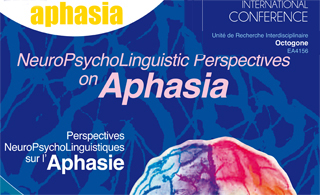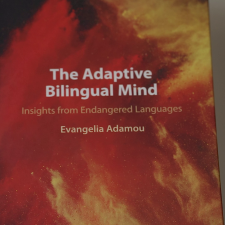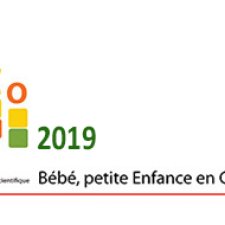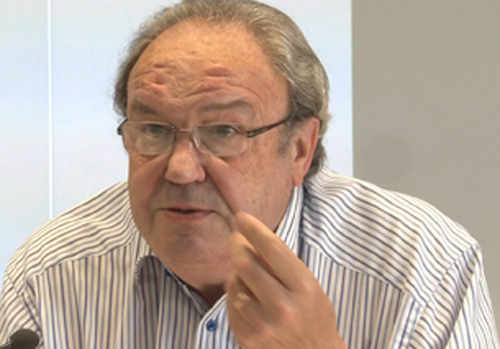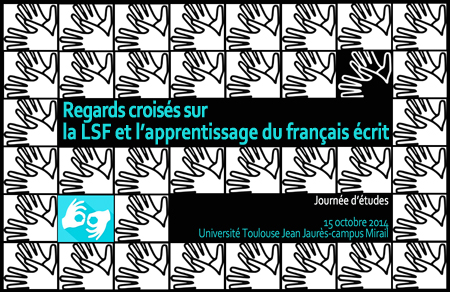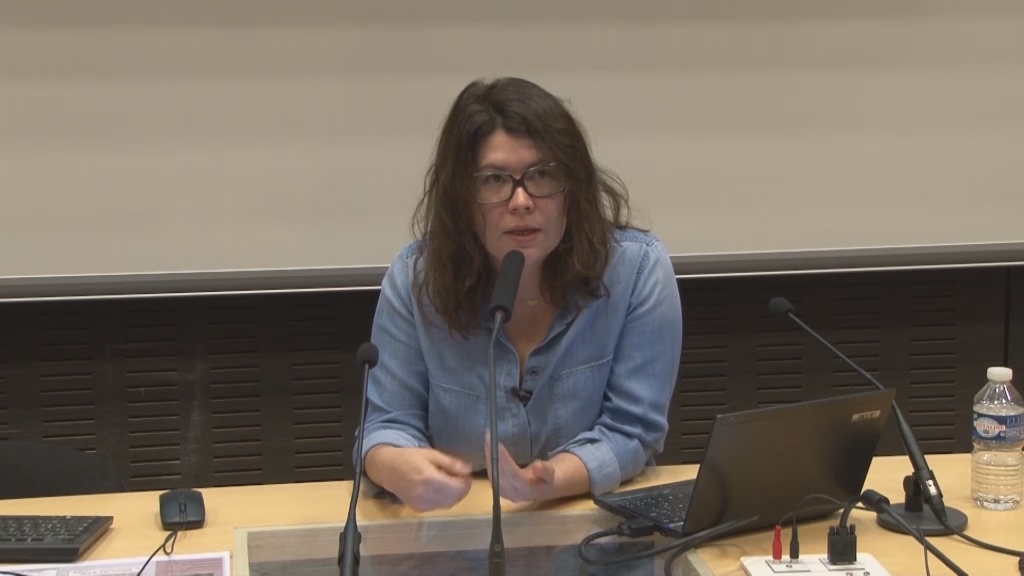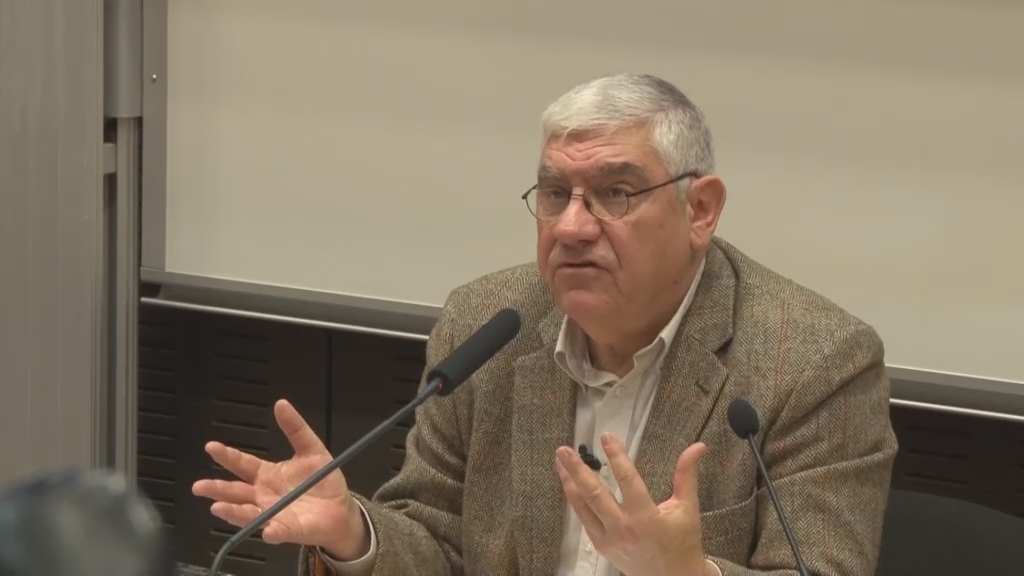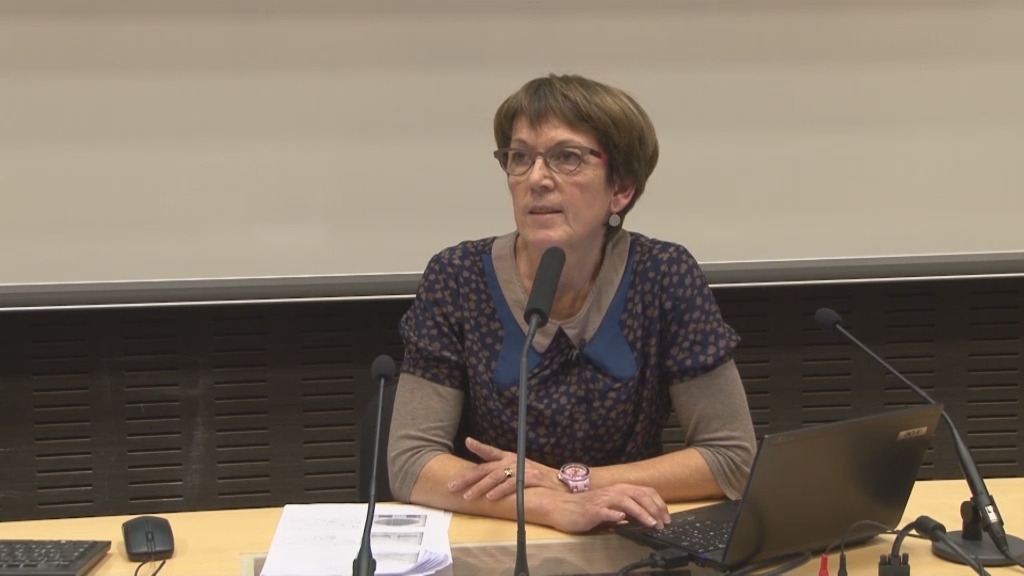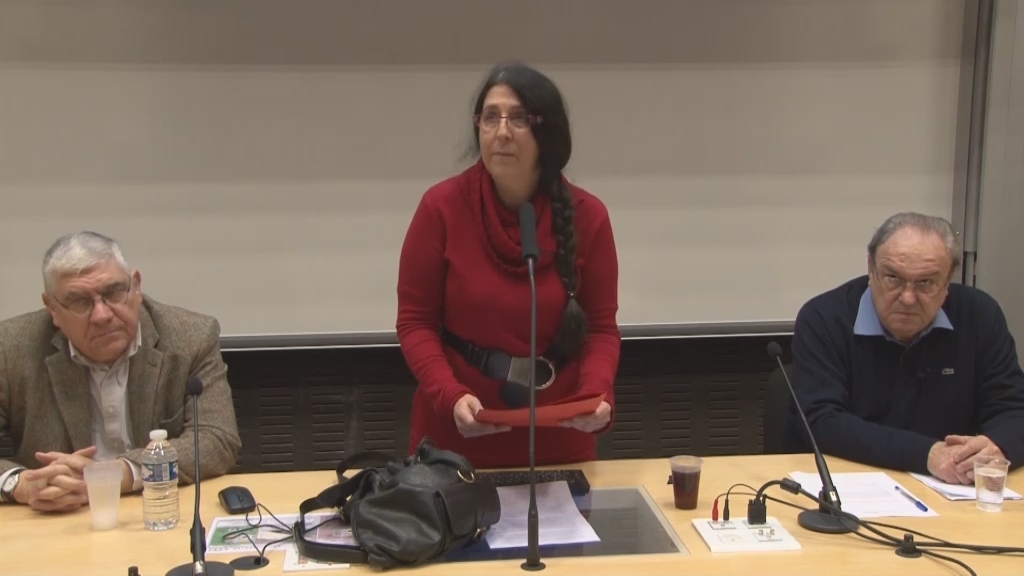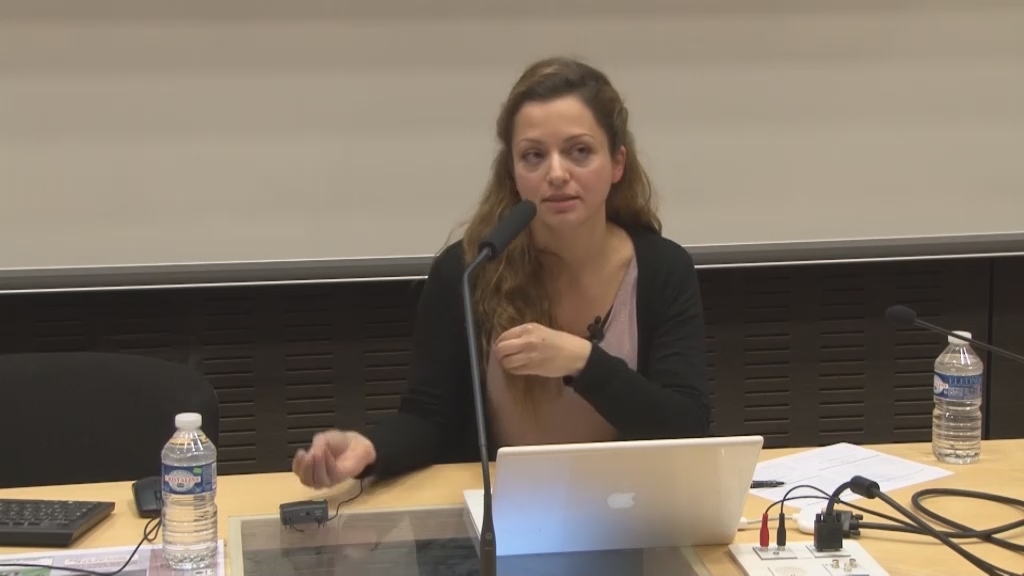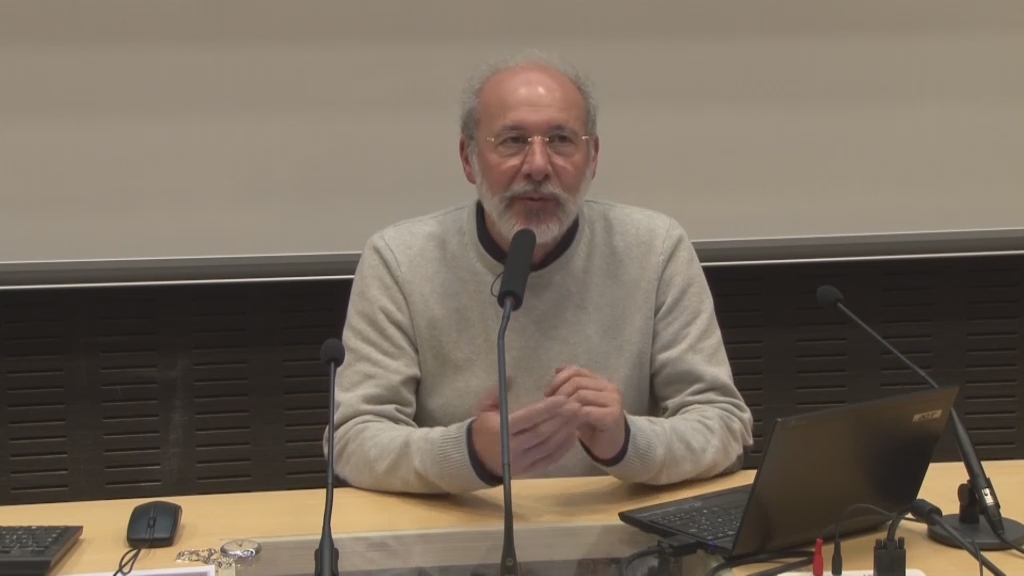Notice
Zipf's law in aphasia / Marjolein Van Egmond
- document 1 document 2 document 3
- niveau 1 niveau 2 niveau 3
Descriptif
Zipf's law in aphasia / Marjolein Van Egmond. In "Perspectives neuropsycholinguistiques sur l'aphasie - NeuroPsychoLinguistic Perspectives on Aphasia", colloque international organisé par l'Unité de Recherche Interdisciplinaire Octogone de l'Université Toulouse II-Le Mirail (France). Toulouse, 21-23 juin 2012.
Inspontaneous speech, quantitative measures can provide valuableinsight into general properties of words while generalizing over thecontent of the conversation. This renders it a suitable method toinvestigate word finding difficulties in aphasia. The quantitativemeasure employed in the current project is the distribution of wordfrequencies. Word frequencies in natural language texts typicallyconform to Zipf’s law, a power law P(k)~k α,where p(k)is the frequency of the kthword if words are ordered by decreasing frequency. This law can alsobe formulated as pƒ~ƒ β,where pƒis the proportion of words whose frequency is ƒ in a given sampletext. Typically, it is found that α≈1and β≈2.
Themeaningfulness of Zipf’s law has been a topic of heated discussion.Zipf (1949) claimed that this word frequency distribution was due tothe principle of least effort. But his opponents claimed that thestatistics of simple random sequences of characters reproduce Zipf’slaw equally well (e.g. Li, 1992; Miller & Chomsky, 1963).However, in both cases comparison between groups can reveal importantdifferences between them.
Zipf’slaw has been shown to apply to every natural language text in everylanguage for which it has been tested (Baroni, 2008). The first totest Zipf’s law in aphasia were Howes and Geschwind (1964). Theyfound that aphasic speech still conforms to Zipf’s law, but with adifferent slope. However, besides methodological issues, it isunclear where this difference arises: in function words only – forwhich problems in aphasic speech are well-known – or also incontent words. This, therefore, was the goal of the present study, inwhich speech from people with non-fluent aphasia was analyzed.
Spontaneousspeech of four Dutch non-fluent aphasic speakers was recorded andanalyzed, and compared to speech of four healthy speakers from theCorpus of Spoken Dutch. Three analyses were made: one with fullsamples, one with only content words and one with only functionwords. Both αand βwere measured.
Forthe α-analysis,it was found that Zipf’s law applies in all analyses. αwasfound to be significantly higher for aphasic speakers compared tohealthy speakers. For β,Zipf’s law applies to all analyses for healthy speakers, but onlyto content words in people with aphasia; for function words it wasfound that Zipf’s law does not apply. In the content wordsanalysis, βwassignificantly lower for aphasic speakers compared to healthyspeakers. Interestingly, in the all-words analysis in healthy adultsboth αand βwere found to be lower than the typically reported values.
Weargue that βis more sensitive than αfor mathematical reasons. We argue that our findings indicate thatthe mental lexicon of non-fluent patients is not qualitativelydifferent from that of unimpaired populations. The deficit is due toreduced processing capacities in these patients, which affectslexical retrieval. The retrieval of function words is affected most.
Intervention / Responsable scientifique
Thème
Documentation
Bibliographie sélective
Baroni, M. (2008). Distributions in text. In A. Lüdelign, M. Kytö (Eds.), Corpus linguistics: An International Handbook. Berlin: Mouton de Gruyter.
Howes, Geschwind (1964). Quantitative studies of aphasic language. Research publications - Association for Research in Nervous and Mental Disease, 42, 229-244.
Li, W. (1992). Random texts exhibit Zipf’s-law-like word frequency distribution. Information Theory, IEEE Transactions on, 38(6), 1842-1845.
Miller, G.A., Chomsky, N. (1963). Finitary models of language users. In R.D. Luce, R. Bush & E. Galanter (Eds.), Handbook of Mathematical Psychology (pp. 419-491). New York: Wiley.
Van Egmond, Marjolein, Van Ewijk, Lizet, Avrutin, Sergey (2015). Zipf’s Law in Non-Fluent Aphasia, Journal of Quantitative Linguistics, 3, vol. 22, 233-249.
Zipf, G.K. (1949). Human behavior and the principle of least effort. An introduction to human ecology. New-York and London: Hafner Publishing Company.
> Voir aussi la bibliographie générale à télécharger dans l'onglet "Documents" de la séquence vidéo d'ouverture du colloque.
Dans la même collection
-
Phonological and phonetic encoding and impairment / Marina Laganaro
LaganaroMarinaPhonological and phonetic encoding and impairment / Marina Laganaro
-
Perspectives neuropsycholinguistiques sur l'aphasie - NeuroPsychoLinguistic Perspectives on Aphasia…
Perspectives neuropsycholinguistiques sur l'aphasie - NeuroPsychoLinguistic Perspectives on Aphasia : ouverture. Colloque international organisé par l'Unité de Recherche Interdisciplinaire Octogone de
-
Entre dysfonctionnement et normalité : une perspective à partir de données anatomo‐fonctionnelles o…
DuboisCyril Michel RobertLahyaniSaoussanEntre dysfonctionnement et normalité : une perspective à partir de données anatomo‐fonctionnelles obtenues auprès de sujets sains et de sujets aphasiques / Saoussan Lahyani, Cyril Dubois. In
-
A « subtle phonetic deficit » in fluent aphasia ? An acoustic and perceptual study / Anna Marczyck
MarczyckAnnaA « subtle phonetic deficit » in fluent aphasia ? An acoustic and perceptual study / Anna Marczyck
-
Pour une approche dynamique des réponses aphasiques obtenues en dénomination d’images : apport de l…
TranThi MaiPour une approche dynamique des réponses aphasiques obtenues en dénomination d’images : apport de l’analyse qualitative / Thi-Mai Tran, in "Perspectives neuropsycholinguistiques sur l'aphasie -
-
Compounding and lexical recursion in aphasia and in Alzheimer’s disease / Zoltán Bánréti
BánrétiZoltánCompounding and lexical recursion in aphasia and in Alzheimer’s disease / Zoltán Bánréti. In "Perspectives neuropsycholinguistiques sur l'aphasie - NeuroPsychoLinguistic Perspectives on Aphasia",
-
Age of acquisition affects word retrieval in spontaneous speech produced by patients with Alzheimer…
GayraudFrédériqueBarkatMélissaAge of acquisition affects word retrieval in spontaneous speech produced by patients with Alzheimer's disease / Frédérique Gayraud, Mélissa Barkat-Defradas. In "Perspectives neuropsycholinguistiques
-
Morpho-syntactic processing of regular and irregular formations in Arabic aphasia / Tariq Khwaileh
KhwailehTariqMorpho-syntactic processing of regular and irregular formations in Arabic aphasia / Tariq Khwaileh. In "Perspectives neuropsycholinguistiques sur l'aphasie - NeuroPsychoLinguistic Perspectives on
-
German Broca’s and Wernicke’s aphasics display similar deficits in syntactic performance / Eva Wimm…
WimmerEvaGerman Broca’s and Wernicke’s aphasics display similar deficits in syntactic performance / Eva Wimmer. In "Perspectives neuropsycholinguistiques sur l'aphasie - NeuroPsychoLinguistic Perspectives on
-
Violating canonicity in Spanish agrammatism / Silvia Martínez-Ferreiro
Martinez-FerreiroSilviaViolating canonicity in Spanish agrammatism / Silvia Martínez-Ferreiro. In "Perspectives neuropsycholinguistiques sur l'aphasie - NeuroPsychoLinguistic Perspectives on Aphasia", colloque international
-
Sentence comprehension deficits in aphasia : additional insights from impairment-specific assessmen…
HanneSandraSentence comprehension deficits in aphasia : additional insights from impairment-specific assessment / Sandra Hanne.
-
Principles of bilingual aphasia assessment and interpretation of findings / Michel Paradis
ParadisMichelPrinciples of bilingual aphasia assessment and interpretation of findings / Michel Paradis. In "Perspectives neuropsycholinguistiques sur l'aphasie - NeuroPsychoLinguistic Perspectives on Aphasia",
Sur le même thème
-
The Adaptive Bilingual Mind
AdamouEvangeliaLa chercheuse Evangelia Adamou (LACITO) présente son ouvrage "The Adaptive Bilingual Mind" (2021, Cambridge University Press).
-
How prosody helps infants and children to break into communication
GervainJuditThe talk will present four sets of studies with young infants and children to show who prosody helps them learn about different aspects of language, from learning basic word order through
-
"Déficit phonético-phonologique dans l’aphasie vasculaire : Réflexion sur le rôle des structures sy…
Les locuteurs ayant subi un AVC entrainant une aphasie avec deficit (phonetico-)phonologique realisent, en production orale, des paraphasies qui alterent soit la structure syllabique de leur langue
-
Socialisations langagières et inégalités scolaires / Élisabeth Bautier
BautierÉlisabethSous-tendue par la question des inégalités d’apprentissage scolaires et des habitudes langagières de l’école qui sont au cœur de ces inégalités, cette communication porte sur les modes de
-
Jacques Lordat (1773-1870) ou la naissance de la neuropsycholinguistique cognitive. Du vitalisme au…
NespoulousJean-LucJacques Lordat (1773-1870) a fait une exceptionnelle carrière, d’une cinquantaine d’années, à la Faculté de médecine de Montpellier, dont il fut un temps Doyen. Très tôt, il s’intéressa aux troubles
-
Regards croisés sur la LSF et l'apprentissage du français écrit : table ronde
Garcia-DebancClaudineRegards croisés sur la LSF et l'apprentissage du français écrit : table ronde, in Journée d'études organisée conjointement par l'École supérieure du professorat et de l'éducation (ESPE, Toulouse), le
-
05 - Mémoire de travail, fonctions exécutives et aphasie (Crisco)
Journée d’étude : "Cerveau et Langage", présentée par Jacques FRANCOIS (Université de Caen) et Jean-Luc NESPOULOUS (Toulouse 2 et I.U.F.)
-
03 - L’émergence et l’évolution du langage humain du point de vue des neurosciences (Crisco)
Journée d’étude : "Cerveau et Langage", présentée par Jacques FRANCOIS (Université de Caen) et Jean-Luc NESPOULOUS (Toulouse 2 et I.U.F.)
-
06 - Troubles lexico-sémantiques dans l’aphasie : évolution des interprétations (Crisco)
Journée d’étude : "Cerveau et Langage"
-
01 - Ouverture de la journée d'étude : "Cerveau et Langage" (Crisco)
Journée d’étude : "Cerveau et Langage"
-
04 - Langage et représentation spatiale chez des locuteurs avec et sans agrammatisme : analyse des …
Journée d’étude : "Cerveau et Langage", présentée par Jacques FRANCOIS (Université de Caen) et Jean-Luc NESPOULOUS (Toulouse 2 et I.U.F.)
-
07 - Langage et mémoire : les leçons des maladies dégénératives (Crisco)
NespoulousJean-LucFrançoisJacquesJournée d’étude : "Cerveau et Langage", présentée par Jacques FRANCOIS (Université de Caen) et Jean-Luc NESPOULOUS (Toulouse 2 et I.U.F.)

